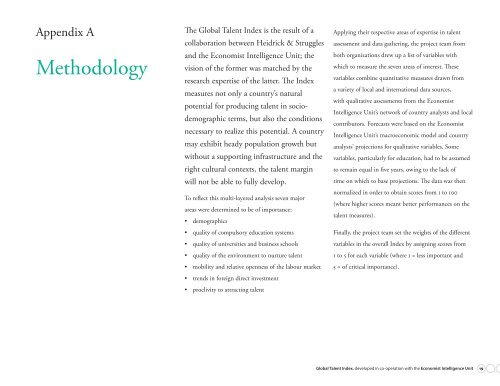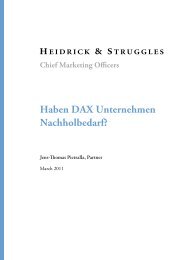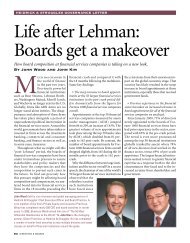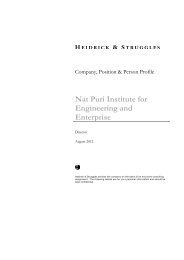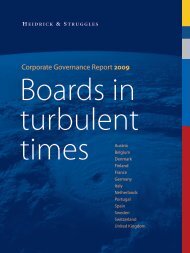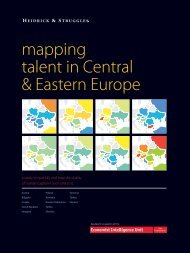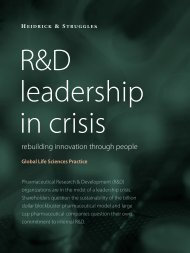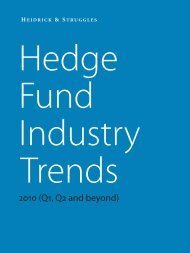Mapping Global Talent: Essays and Insights - Heidrick & Struggles
Mapping Global Talent: Essays and Insights - Heidrick & Struggles
Mapping Global Talent: Essays and Insights - Heidrick & Struggles
You also want an ePaper? Increase the reach of your titles
YUMPU automatically turns print PDFs into web optimized ePapers that Google loves.
Appendix A<br />
Methodology<br />
The <strong>Global</strong> <strong>Talent</strong> Index is the result of a<br />
collaboration between <strong>Heidrick</strong> & <strong>Struggles</strong><br />
<strong>and</strong> the Economist Intelligence Unit; the<br />
vision of the former was matched by the<br />
research expertise of the latter. The Index<br />
measures not only a country’s natural<br />
potential for producing talent in socio-<br />
demographic terms, but also the conditions<br />
necessary to realize this potential. A country<br />
may exhibit heady population growth but<br />
without a supporting infrastructure <strong>and</strong> the<br />
right cultural contexts, the talent margin<br />
will not be able to fully develop.<br />
To reflect this multi-layered analysis seven major<br />
areas were determined to be of importance:<br />
• demographics<br />
• quality of compulsory education systems<br />
• quality of universities <strong>and</strong> business schools<br />
• quality of the environment to nurture talent<br />
• mobility <strong>and</strong> relative openness of the labour market<br />
• trends in foreign direct investment<br />
• proclivity to attracting talent<br />
Applying their respective areas of expertise in talent<br />
assessment <strong>and</strong> data gathering, the project team from<br />
both organizations drew up a list of variables with<br />
which to measure the seven areas of interest. These<br />
variables combine quantitative measures drawn from<br />
a variety of local <strong>and</strong> international data sources,<br />
with qualitative assessments from the Economist<br />
Intelligence Unit’s network of country analysts <strong>and</strong> local<br />
contributors. Forecasts were based on the Economist<br />
Intelligence Unit’s macroeconomic model <strong>and</strong> country<br />
analysts’ projections for qualitative variables. Some<br />
variables, particularly for education, had to be assumed<br />
to remain equal in five years, owing to the lack of<br />
time on which to base projections. The data was then<br />
normalized in order to obtain scores from 1 to 100<br />
(where higher scores meant better performances on the<br />
talent measures).<br />
Finally, the project team set the weights of the different<br />
variables in the overall Index by assigning scores from<br />
1 to 5 for each variable (where 1 = less important <strong>and</strong><br />
5 = of critical importance).<br />
<strong>Global</strong> <strong>Talent</strong> Index, developed in co-operation with the Economist Intelligence Unit 1


